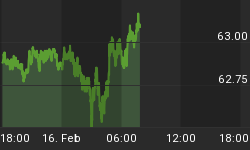Beyond the painfully obvious plight of a planet addicted to fossil fuels, climate change has another bogeyman that few--with the possible exception of Keanu Reeves--would be willing to give up.
Yet, it’s responsible for a huge chunk of our global greenhouse gas emissions.
In fact, by 2025, it could be responsible for a staggering 20 percent of global electricity consumption and up to 5.5 percent of all carbon emissions.
And you’re doing it right now.
That bogeyman is the Internet of Things (IoT) and the tsunami of data it must power.
Academics are challenging the notion that we can considerably reduce carbon emissions by increasing efficiency and cutting down on waste.
In fact, they warn that the internet explosion and increasing connectivity via the IoT and smart devices could increase global emissions by 3.5 percent by 2020 and up to 14 percent by 2040.
In an update to a 2016 peer-reviewed study, Swedish researcher Anders Andrae says the ICT industry’s power demand is likely to increase from 200-300 terawatt hours (TWh) of electricity a year in 2017, to 1,200-3,000TWh by 2025.
Data centers alone could emit 1.9 gigatonnes (Gt) of carbon emissions, or 3.2 percent of the global total. Related: Oil Rebounds On Rare Market Optimism
Let’s put that into perspective: Consider that the International Energy Agency (IEA) reported that global electricity demand rose by 4 percent in 2018, the fastest pace since 2010. Our planet consumed a staggering 26,700 TWh of electricity in 2018, with China gobbling up the lion’s share at 6,167 TWh, while the United States was the second largest consumer at 3,971TWh, and India third at 1,243TWh.
Coal supplied the biggest chunk of our electricity at 38 percent, while gas and hydro were second and third at 23 percent and 19 percent, respectively.
Only 3 percent of our electricity came from oil.
The percentage of electricity generation from oil has been in constant decline since 1973 when it stood at an all-time high of 22 percent. All other forms of power generation, including renewables, coal, gas and nuclear recorded growth with oil being the only decliner.

(Click to enlarge)
Source: IEA

(Click to enlarge)
It’s not by coincidence that heightened electricity consumption has come at a time when the internet is growing at an unprecedented rate.
The Next Web reported that there were 4.4 billion internet users across the globe at the beginning of the year, a 9-percent year-over-year increase.
India recorded the biggest growth in internet users at 97.8 million with China and the United States taking second and third slots with 50.7 million and 25.4 million additional users, respectively.
But it’s not just people chatting on Facebook and WhatsApp that’s putting paid plans to control emissions. It’s far bigger than that.
The Internet of Things (IoT) is the network of smart devices such as home appliances and vehicles that contain an assortment of electronics, sensors, actuators, software and connectivity (usually the internet) which allows them to connect, interact and exchange data. Related: Is U.S. Shale Circling The Drain?
US researchers now expect internet power consumption to triple over the next five years as one billion more people in developing countries come online while IoT, robots, driverless cars, artificial intelligence and video surveillance grow exponentially in rich countries.
According to projections by Gartner, there will be 20 billion interconnected devices by 2020.

(Click to enlarge)
Source: The Next Web
And now back to our question of the day: how many barrels of oil does the internet consume?
According to current estimates, the internet consumes ~3-5 percent of the world’s electricity output, which works out to 1,068TWh at the mid-point.
Statista estimates that 1 barrel of oil can generate about 578kWh of power.

(Click to enlarge)
To generate 1,068TWH of electricity you would therefore require 1,847,750,000 barrels of oil, or 1.8 Gbbl in shorthand.
That’s a tremendous amount of oil. Related: SoftBank Urges WeWork To Pause IPO Plans
However, oil accounts for only 3 percent of our electricity mix, which works out to 55,432,000 barrels.
Luckily, we are not about to run out of oil to power the internet considering that the world produced an average of 94.7 million barrels of oil every day in 2018. Even a six-fold increase as predicted by Andrae would still leave us well covered.
What’s disturbing is the sheer amount of greenhouse gases our ocean of connectivity will be spewing out.
The End Game?
As climate change becomes a formidable foe, and as negative attention shifts to fossil fuels on this battlefield, most forget about the internet--the very tool being used to organize action on climate change. Yet this very same tool is becoming one of our worst emitters of greenhouse gases. Every time we use data, we’re contributing to the destruction of the planet.
And in this case, it’s difficult to make oil the monster.
Instead, climate change activism, which goes down online in large part, is being powered most notably by coal, which accounts for nearly 40 percent of the electricity we consume globally.
In other words, depending on where you live, every time you get online the chances are, you’re killing the planet with another chunk of dirty coal.
By Alex Kimani for Oilprice.com
More Top Reads From Safehaven.com:

















